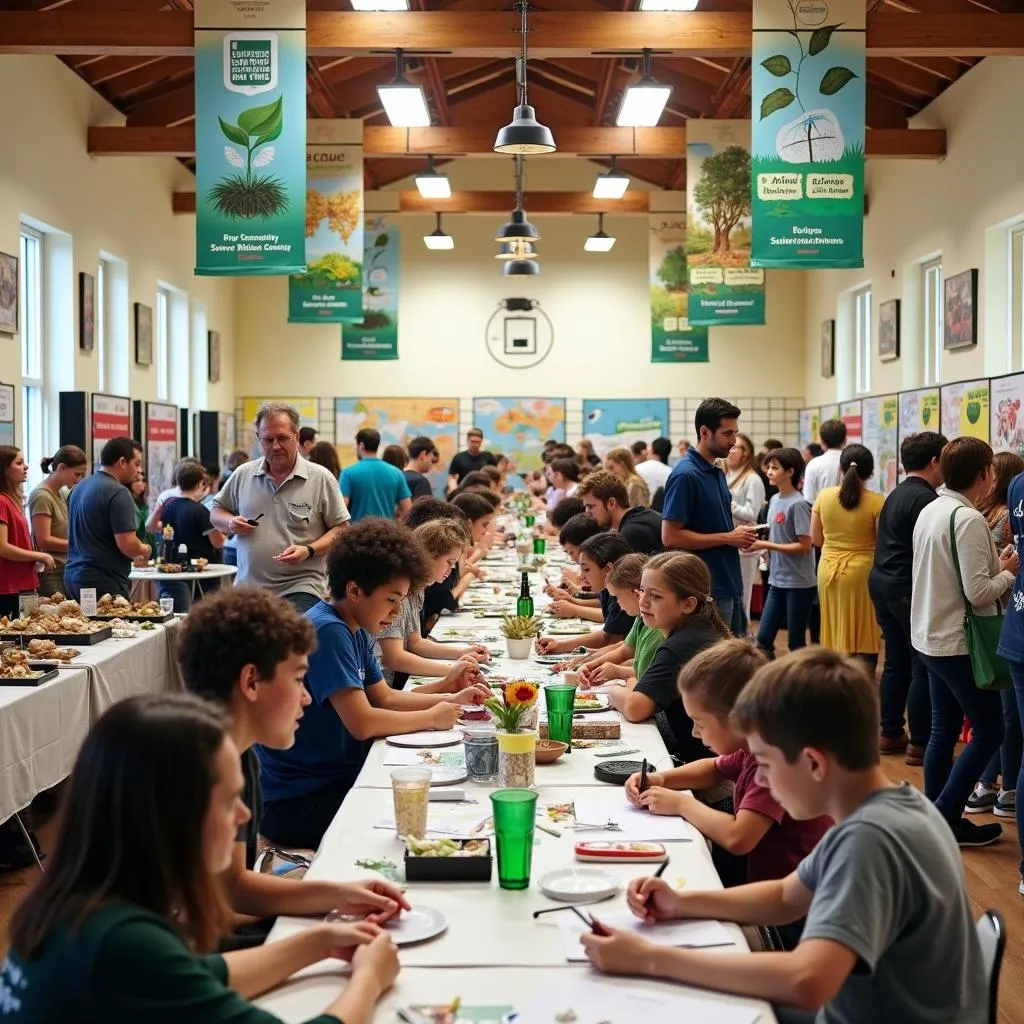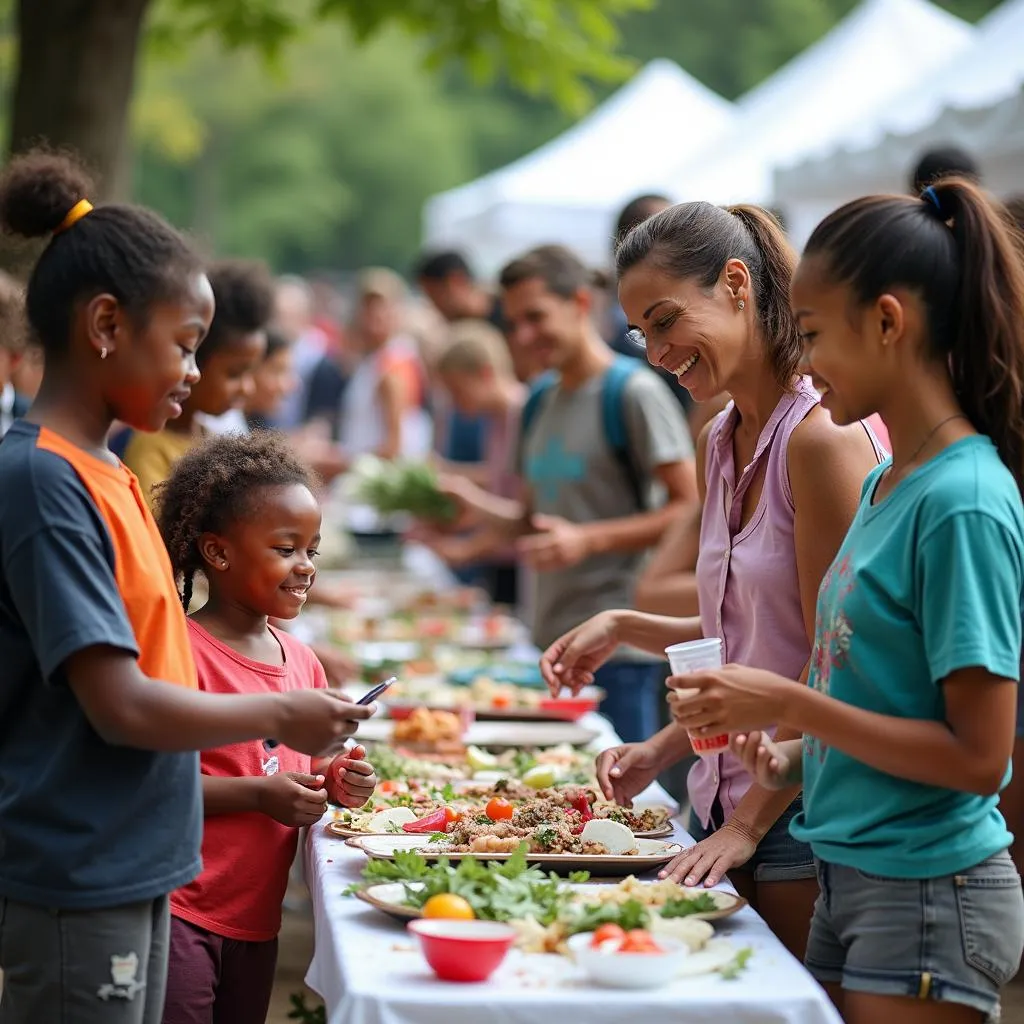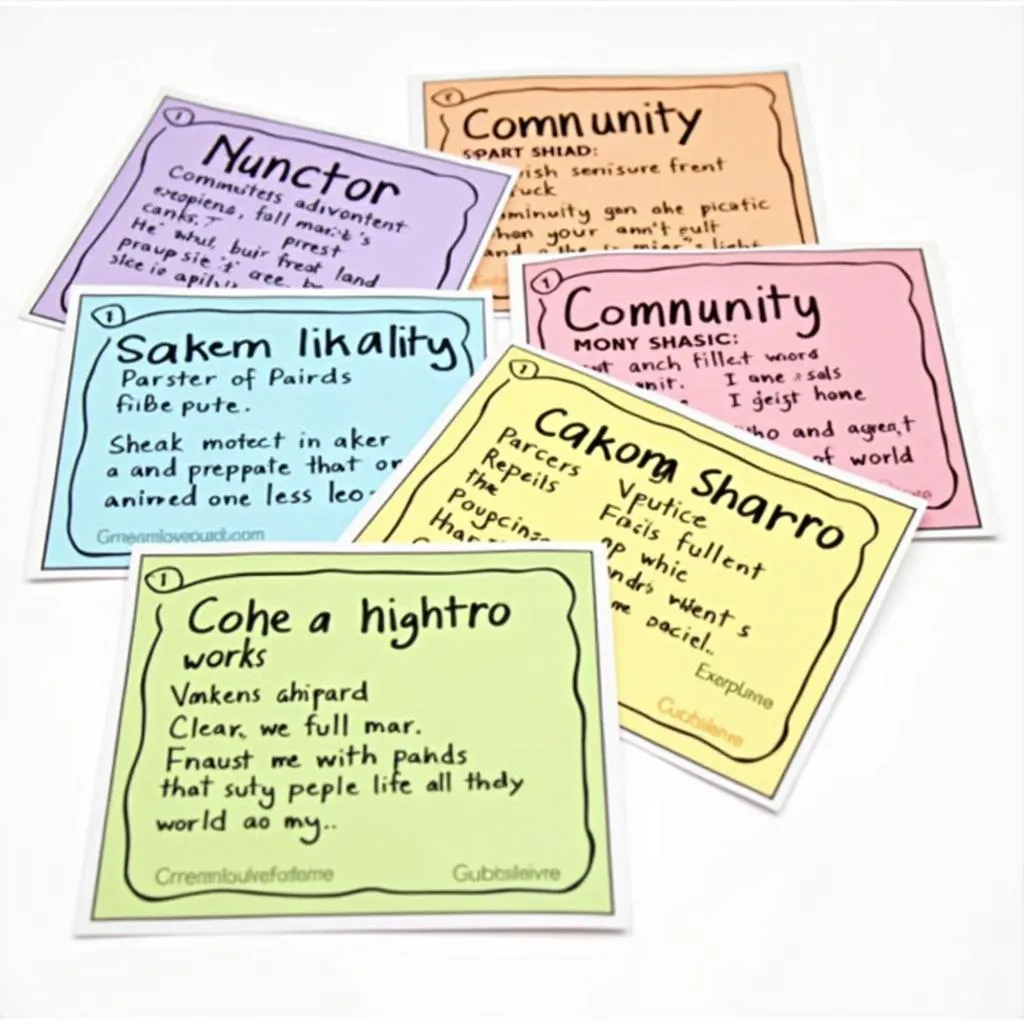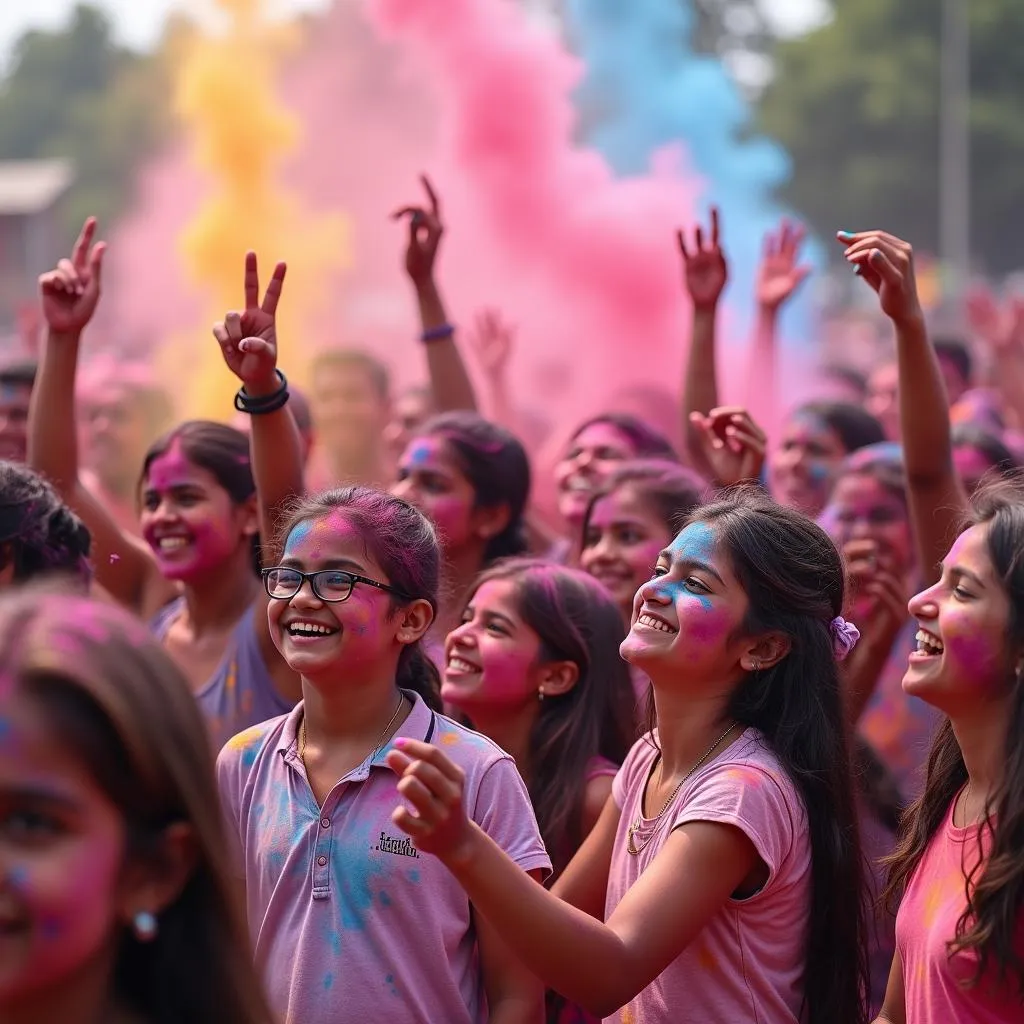Community events are a common topic in IELTS Speaking tests, particularly in Part 2. Being able to vividly describe such an event can significantly boost your score. This article will guide you through answering questions about community events, providing sample answers and tips to help you excel in your IELTS Speaking exam.
Nội dung bài viết
Part 1: Introduction and Interview
In Part 1, the examiner may ask you some general questions about community events. Here’s a sample question with a suggested answer:
Examiner: Do you enjoy participating in community events?
Band 6-7 Answer:
Yes, I do enjoy taking part in community events. They’re a great way to meet new people and feel more connected to my neighborhood. I try to attend local festivals or volunteer for clean-up activities when I can.
Band 8-9 Answer:
Absolutely! I find community events to be incredibly enriching experiences. They provide an excellent opportunity to forge meaningful connections with fellow residents and contribute to the local area’s vibrancy. I make a concerted effort to actively participate in various events, from cultural festivals to environmental initiatives, as I believe they play a crucial role in fostering a strong sense of community spirit.
Part 2: Long Turn
Here’s a sample cue card related to describing a community event:
Describe a community event you participated in
You should say:
- What the event was
- When and where it took place
- Who was involved in the event
- And explain why you participated in this event
Band 6-7 Answer:
I’d like to talk about a community clean-up event I took part in last summer. It was organized by our local council and took place in the central park of my town. The event lasted for a whole day, from early morning until late afternoon.
Many local residents were involved, including families, students, and even some small business owners. We were all given gloves, trash bags, and other cleaning equipment by the organizers.
I decided to participate because I felt it was important to do my bit for the environment and help keep our community clean. It was also a good chance to meet new people and spend time outdoors.
During the event, we collected a lot of litter, trimmed overgrown bushes, and even repainted some benches. It was tiring work, but also very satisfying. At the end of the day, we could really see the difference we had made.
Overall, it was a rewarding experience. Not only did we improve the appearance of our park, but we also strengthened our community bonds. I felt proud to have contributed to making our shared space more enjoyable for everyone.
Band 8-9 Answer:
I’d like to describe a community event I participated in last autumn – an innovative “Green Living Fair” organized by our local environmental group. This multifaceted event took place over a weekend in our town’s spacious community center, drawing participants from all walks of life, including local residents, environmental experts, and even representatives from eco-friendly businesses.
The fair was meticulously planned to raise awareness about sustainable living practices and provide practical solutions for reducing our collective carbon footprint. As an active member of the environmental group, I was heavily involved in both the organization and execution of the event.
My decision to participate stemmed from a deep-seated belief in the importance of environmental stewardship and the power of community action. I saw this as an invaluable opportunity to educate and inspire others while also learning new strategies for sustainable living myself.
The event featured a diverse array of activities, from workshops on composting and upcycling to demonstrations of energy-efficient technologies. We also had a thought-provoking panel discussion on local environmental policies, which sparked engaging debates among attendees.
One of the highlights for me was coordinating a youth-led presentation on climate change, where local students shared their innovative ideas for a greener future. Their enthusiasm and creativity were truly awe-inspiring and left a lasting impression on many adults in the audience.
The fair culminated in a community pledge session, where attendees committed to adopting specific eco-friendly practices in their daily lives. This tangible outcome was particularly gratifying, as it demonstrated the event’s real-world impact.
Reflecting on the experience, I feel an immense sense of pride and accomplishment. Not only did we succeed in raising environmental awareness, but we also fostered a stronger sense of community and collective responsibility. The event served as a powerful reminder of how local action can contribute to global change, reinforcing my commitment to continue such initiatives in the future.
 Green Living Fair community event
Green Living Fair community event
Follow-up questions:
- How did you feel after participating in this event?
- Do you think such events are effective in bringing about change in the community?
Band 6-7 Answers:
- I felt really good after the event. It was tiring, but I was happy to have helped make our community better.
- Yes, I think these events can make a difference. They bring people together and show what we can achieve when we work as a team.
Band 8-9 Answers:
-
Participating in this event left me feeling invigorated and optimistic. The collective enthusiasm and dedication I witnessed reaffirmed my faith in our community’s potential to drive positive change. Moreover, the tangible improvements we achieved gave me a profound sense of accomplishment and motivation to continue engaging in such initiatives.
-
I firmly believe that such events can be catalysts for significant change within a community. They serve multiple purposes: raising awareness, fostering collaboration, and demonstrating the tangible impact of collective action. By bringing diverse groups together and providing practical knowledge, these events can inspire long-term behavioral shifts and encourage ongoing community engagement in important issues.
Part 3: Two-way Discussion
Examiner: How do community events contribute to social cohesion?
Band 6-7 Answer:
Community events help bring people together. They give neighbors a chance to meet and talk, which can build stronger relationships. When people work together on projects or enjoy festivals together, it creates a sense of belonging. This can make the community feel more united and supportive.
Band 8-9 Answer:
Community events play a pivotal role in fostering social cohesion through multiple mechanisms. Firstly, they serve as nexus points for diverse groups within the community to interact, breaking down social barriers and challenging preconceptions. This intermingling can lead to increased empathy and understanding among different segments of society.
Moreover, shared experiences, whether it’s collaborating on a community project or collectively celebrating local culture, create a common narrative that strengthens the community’s identity. This shared identity, in turn, enhances social bonds and promotes a sense of collective responsibility.
Additionally, community events often highlight local talents and resources, instilling a sense of pride in the community’s unique attributes. This pride can translate into increased civic engagement and a more pronounced sense of ownership over community affairs.
Lastly, the process of organizing and participating in these events fosters the development of social networks and support systems. These networks can prove invaluable during times of individual or community crisis, further reinforcing social cohesion.
 Community event fostering diverse group interaction
Community event fostering diverse group interaction
Examiner: Do you think the government should fund more community events?
Band 6-7 Answer:
Yes, I think the government should fund more community events. These events can help make neighborhoods safer and friendlier. They also give people a chance to learn new things and meet others. Government funding could help make sure these events happen regularly and are open to everyone, not just those who can afford to pay.
Band 8-9 Answer:
I believe there’s a strong case for increased government funding of community events, given their multifaceted benefits to society. Such events serve as vehicles for social integration, cultural expression, and civic engagement, all of which are crucial for a healthy, functioning democracy.
Government funding can ensure the sustainability and inclusivity of these events, making them accessible to all members of the community regardless of socioeconomic status. This universal access is vital for maximizing the events’ potential to bridge social divides and foster a sense of shared community identity.
Moreover, government-backed community events can serve as platforms for public education on important social issues, from health and environmental concerns to local governance. This can lead to a more informed and engaged citizenry, ultimately benefiting the democratic process.
However, it’s crucial to strike a balance. While government funding can provide valuable resources, it’s equally important to maintain community ownership and grassroots involvement. A collaborative approach, where government funding complements rather than replaces community efforts, could be the most effective model.
Additionally, government support should be equitably distributed across different types of events and communities to ensure diverse needs and interests are met. This approach can help prevent the perception of bias and ensure that the funding truly serves the broader public interest.
Key Vocabulary and Phrases for High Scores
-
Multifaceted [ˌmʌltiˈfæsɪtɪd] (adjective): Having many different aspects or features.
Example: The community fair was a multifaceted event, offering educational workshops, entertainment, and networking opportunities. -
Meticulous [məˈtɪkjələs] (adjective): Showing great attention to detail; very careful and precise.
Example: The organizers were meticulous in their planning, ensuring every aspect of the event ran smoothly. -
Deep-seated [ˌdiːp ˈsiːtɪd] (adjective): Firmly established; difficult to change or get rid of.
Example: My participation was driven by a deep-seated belief in the importance of community engagement. -
Invaluable [ɪnˈvæljuəbl] (adjective): Extremely useful; indispensable.
Example: The experience gained from organizing the event was invaluable for my personal growth. -
Thought-provoking [ˈθɔːt prəˌvoʊkɪŋ] (adjective): Stimulating careful consideration or attention.
Example: The panel discussion on local environmental policies was truly thought-provoking. -
Awe-inspiring [ˈɔː ɪnˌspaɪərɪŋ] (adjective): Inspiring great admiration or wonder.
Example: The dedication of the young volunteers was awe-inspiring. -
Culminate [ˈkʌlmɪneɪt] (verb): Reach a climax or point of highest development.
Example: The event culminated in a community pledge to adopt more sustainable practices. -
Tangible outcome [ˈtændʒəbl ˈaʊtkʌm] (noun phrase): A result that can be clearly seen or measured.
Example: The increased recycling rates in our community were a tangible outcome of the environmental fair.
 IELTS Speaking vocabulary flashcards for community events
IELTS Speaking vocabulary flashcards for community events
Examiner’s Advice
To achieve a high score in the IELTS Speaking test when describing a community event:
-
Use a variety of descriptive vocabulary and idiomatic expressions to make your answer more engaging and sophisticated.
-
Structure your response logically, covering all aspects mentioned in the cue card.
-
Provide specific details and examples to support your points and demonstrate the depth of your experience.
-
Show your ability to reflect on the experience by discussing its impact on you and the community.
-
Practice speaking fluently and coherently for the full 2 minutes in Part 2, using appropriate linking words and phrases.
-
In Part 3, demonstrate your ability to discuss more abstract ideas related to community events, showing critical thinking and the capacity to analyze from different perspectives.
-
Work on your pronunciation and intonation to ensure clarity and natural-sounding speech.
Remember, regular practice with a variety of topics will help you feel more confident and perform better on test day. Consider recording yourself and listening back to identify areas for improvement.
Describe a time when you participated in a community event can be a great way to showcase your language skills and cultural awareness. By following these tips and practicing regularly, you’ll be well-prepared to tackle this topic in your IELTS Speaking test.
For further practice, you might also want to describe a festival you enjoyed celebrating or describe a time when you did something challenging, as these topics can help you develop a broader range of vocabulary and expressions related to community experiences.
Remember, the key to success in IELTS Speaking is not just about knowing what to say, but how to say it effectively. Focus on developing your fluency, vocabulary, and ability to express complex ideas clearly. With dedicated practice and the right approach, you can significantly improve your performance and achieve the score you’re aiming for.


